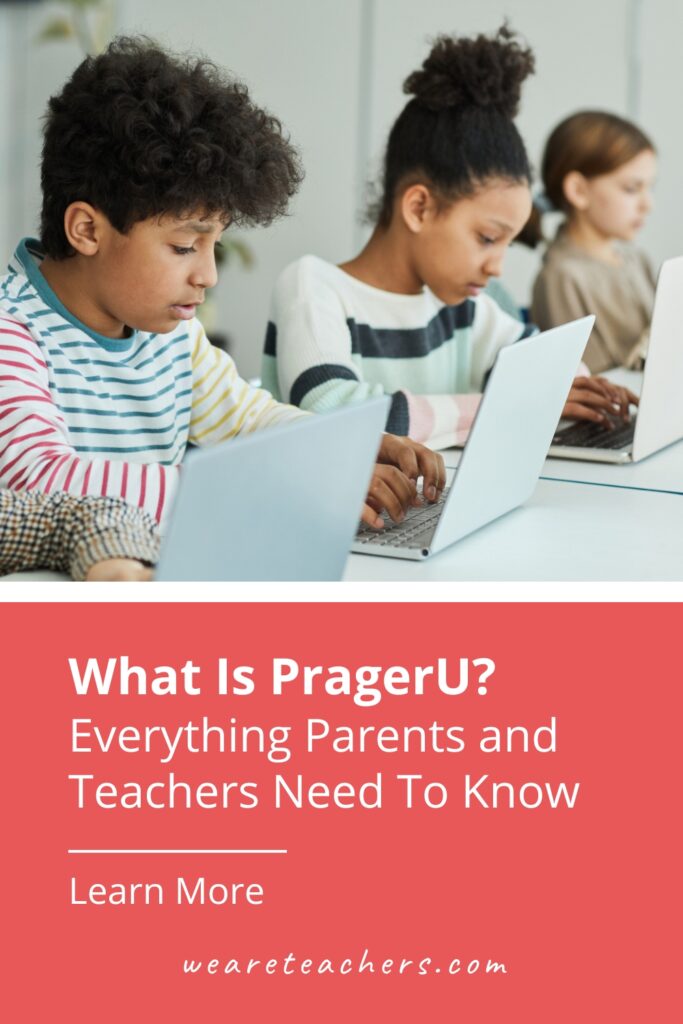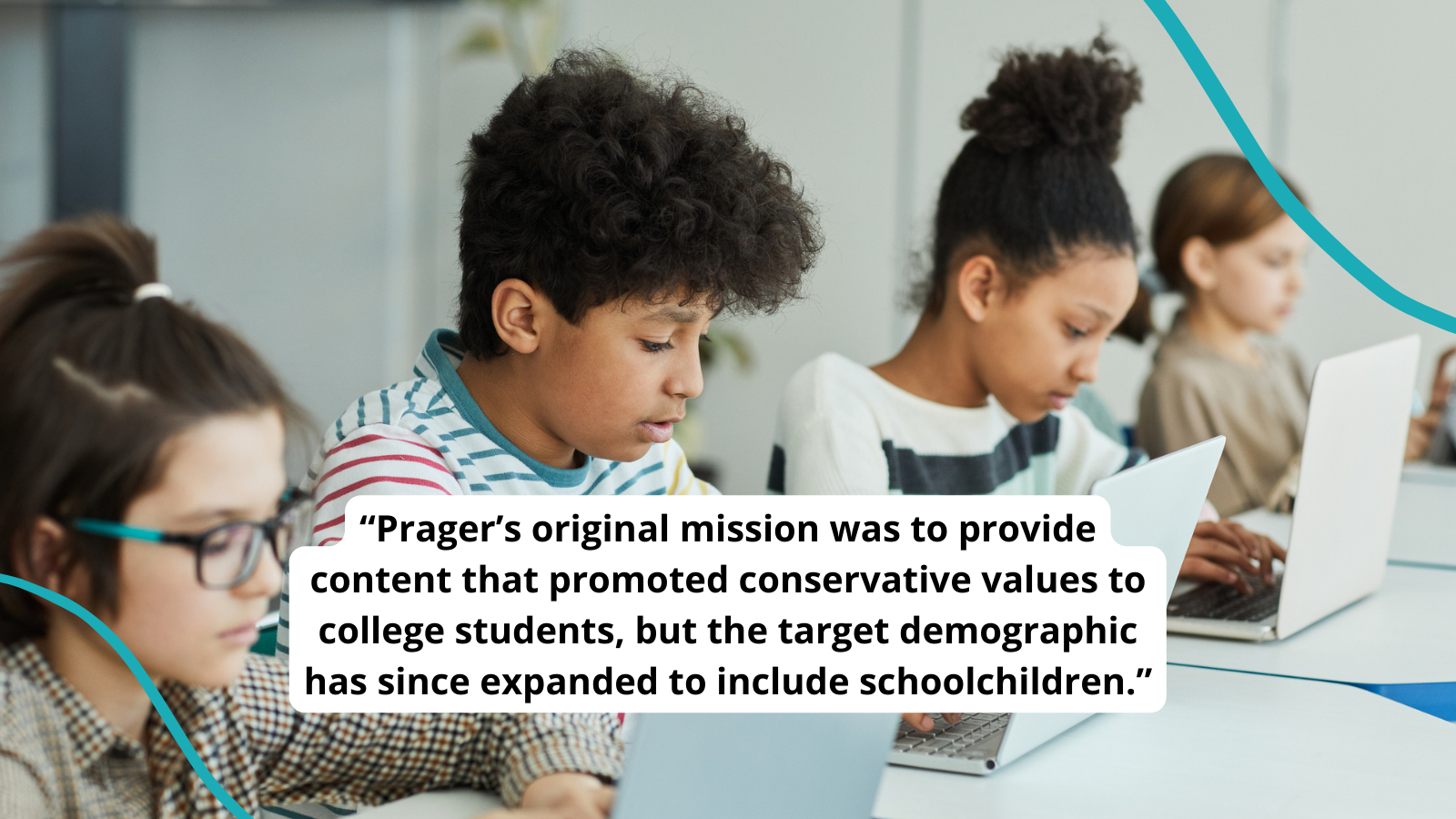Do you know the name PragerU? It’s a name that’s becoming increasingly common—and in many cases, controversial.
What is PragerU?
PragerU is a media company founded in 2009 by talk show host Dennis Prager. Prager’s original mission was to provide content that promoted conservative values to college students, but the target demographic has since expanded. Prager claims PragerU’s educational resources now have approval for use as a supplemental resource in Texas and Florida K-12 schools.
PragerU’s educational resources have already faced criticism for downplaying slavery and calling into question the role of humans in climate change. PragerU’s site, on the other hand, describes themselves as offering “a free alternative to the dominant left-wing ideology in culture, media, and education.” CEO Marissa Streit describes PragerU as “edutainment—an intersection of education and entertainment,” with the goal of “shaping culture and preserving American ideals.”
If this is the first you’re hearing of PragerU, don’t worry. Here’s your crash course in what parents and teachers should be aware of as these resources gain media attention.
What parents and teachers need to know about PragerU’s educational resources
1. PragerU is not an accredited university
Despite the “U” in their name, PragerU is neither an accredited university nor affiliated with one. They don’t claim to be—they fully acknowledge that they do not confer degrees. They do, however, tout themselves as “the most accessible and influential online resource for explaining the concepts that have made America great.”
Plenty of curricular media companies are not, in and of themselves, academic institutions. And supplemental curricular resources are abundantly available. So why might PragerU be different from other companies creating supplemental educational content, like BrainPOP or Generation Genius?
One way PragerU’s educational resources distinguish themselves from other materials is that they’re freely available online. Anyone who has tried to get district funding for approved technology like BrainPOP will tell you it’s an involved process. You have to write proposals—sometimes multiple proposals. In some districts, you need school board permission to even use the funds. Stakeholders carefully evaluate these resources with multiple viewpoints. The decision to adopt new resources can often take months to years.
By contrast, PragerU is accessible for free at any time. This means there won’t necessarily be discussion or presentation to local boards of education, or even to building admin, before incorporating the materials into classrooms.
2. PragerU’s educational resources are not based in research
To be clear, high-quality educational materials don’t necessarily have to live behind a paywall. However, any material looking to earn a place in public school classrooms needs to be able to prove its efficacy. Ideally, this evidence comes from independent research done by organizations without a political agenda.
Generation Genius videos are a collaboration with the National Science Teaching Association (NSTA). Their website provides links to a study of their efficacy conducted by WestEd, “a non-partisan, non-profit research group whose clients include the U.S. Department of Education.” Similarly, BrainPOP’s “About” page links to research articles detailing their efficacy, with studies coming from academic institutions such as the University of Michigan and New York University, among others.
PragerU’s “About” page provides a link to their 2023 biannual review. In reading their “Impact Report,” I found statistics detailing their viewership and app downloads—and academic research was notably absent.
3. Using PragerU’s educational resources could land public schools and teachers in hot water
Legal jargon can be dense and tricky to navigate. Luckily, Cornell Law School’s Legal Information Institute helpfully breaks down the Establishment Clause of the First Amendment. The institute explains that the clause “not only forbids the government from establishing an official religion, but also prohibits government actions that unduly favor one religion over another.” Notably, this clause additionally “prohibits the government from unduly preferring religion over non-religion, or non-religion over religion.” This clause, part of the First Amendment of the U.S. Constitution, is present in schools in a multitude of ways. It’s the reason prayers shouldn’t be led during school hours, or that schools shouldn’t celebrate specific religious holidays.
So what does any of this have to do with PragerU’s educational resources? They produce some content that promotes religious ideals, which would violate the Establishment Clause if used in public schools. The series “Leo & Layla’s History Adventures” chronicles the adventures of tween Layla and her elementary-age brother Leo. Together, the siblings travel through time, learning life lessons from prominent historical figures. Some of these include biblical figures Gideon, Joseph, Jacob, Ruth, and Moses.
In these videos, these figures extol the “importance of turning to God” and describe the misfortune that befell them when they strayed from their faith.
The videos cover topics such as forgiveness, belief in one’s self, and loyalty. There is nothing inherently religious about any of these concepts, and they are important teaching points for the third-to-fifth graders the series targets. However, using religious figures and references to God as a teaching tool is a direct violation of the Establishment Clause. These could be useful in Sunday school or Vacation Bible School (Leo and Layla are both regular attendees) but are unconstitutional for use in public school classrooms.
4. PragerU’s educational resources contain misleading representations of historical figures
Leo and Layla’s historical adventures extend beyond biblical characters. They also visit prominent civil rights leaders Booker T. Washington, Frederick Douglass, and Martin Luther King Jr. In each video, the siblings engage in dialogue with their historical host. The dialogue is not comprised of direct quotations or even based on quotations from each figure. Instead, the historical figures respond through the lens of PragerU’s values and belief systems—which often contradict these leaders’ real personas.
In one video, Booker T. Washington tells the children he is “so proud and thankful to be an American” because the United States was “one of the first places on earth to outlaw slavery.”
An actual quote by Booker T. Washington states, “There is a certain class of race problem-solvers who don’t want the patient to get well, because as long as the disease holds out, they have not only an easy means of making a living, but also an easy medium through which to make themselves prominent before the public.” Speaking for Washington, would we say he was glad in any way to have been born into one of the worst atrocities in human history?
Another PragerU video shows Frederick Douglass consoling the siblings, who are upset by the destructive protests they see on TV.
Considering Douglass said, “Agitate, agitate, agitate,” when asked for his best advice weeks before his death, this is misleading at best. With respect to the fight for justice, Douglass said, “the struggle may be a moral one, or it may be a physical one, or it may be both. But it must be a struggle. Power concedes nothing without a demand. It never did and it never will.” Critics argue this isn’t creative interpretation—it’s intentional dishonesty with a political agenda.
The concept of modern students time-traveling and interacting with history could be highly engaging to students. Additionally, the videos include a touch of humor and relatable scenarios to pique students’ interest. However, PragerU putting words in the mouths of prominent historical figures is concerning. The concept of Leo and Layla has merit, but it shouldn’t come at the expense of misrepresentation of America’s civil rights leaders.
PragerU in review
Right now, it’s unclear if and how Florida and Texas schools will incorporate PragerU. While the PragerU website lists these states as officially approving the resources, state representatives disagree. Some of the resources that are free of religious and historical content, such as those on budgeting and personal finance, could be innocuous additions to classroom lessons. Others would invite constitutional violations or inaccurate representations of historical figures.
The main takeaway? Parents and teachers need to decide for themselves whether the messages in PragerU’s “educational” resources are ones they want children learning.
For more articles like this, be sure to subscribe to our newsletters.


